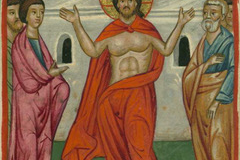Auschwitz: in the abyss of suffering, love can triumph
Cardinal Jean-Marie Lustiger, archbishop of Paris, read a message from Pope John Paul yesterday at a gathering of more than 30 world leaders to mark the 60th anniversary of the liberation of prisoners from the Auschwitz-Birkenau concentration camp in Poland. The cardinal is the Pope's special envoy to these commemorative ceremonies. The Holy Father called what happened in Auschwitz "the tragic fruit of programmed hatred," and said we must remember the millions "who, through no fault of their own, bore inhuman sufferings and were annihilated in the gas chambers and crematoriums." He recalled his 1979 trip, as Pope, to Auschwitz, where he "paused before memorial stones with dedications to the victims in many languages, ... stopping the longest before those written in Hebrew. I said: ... This people has its origins in Abraham, who is also our father in faith, as Paul of Tarsus said. This very people, who received from God the commandment 'Thou shall not kill', itself experienced in a special measure what it means to kill.. No one can stop in front of these memorials with indifference. "I repeat those words today. No one may overlook the tragedy of the Shoah. That attempt at a systematic destruction of an entire people falls like a shadow over Europe and the entire world; it is a crime that forever darkens the history of mankind. May this serve as a warning, today and for the future: there can never be a yielding to ideologies which justify trampling on human dignity on the basis of differences in race, skin colour, language or religion. I appeal to everyone, and especially to those who, in the name of religion, would resort to acts of oppression and terror." The Holy Father said these reflections "accompanied" him at the penitential liturgy in St. Peter's during the Jubilee Year 2000 and on his pilgrimage to the Holy Land when he visited the Yad Vashem holocaust monument in Jerusalem. Continuing with memories of his 1979 trip to Auschwitz, John Paul II recalled the many memorials there written in Russian, noting that "the Russians had the highest number of people who so tragically lost their lives (in the war). The Roma were also destined to total extermination in Hitler's plan." Referring to the memorials inscribed in his native Polish, the Holy Father quoted his words from 1979, when he said that Auschwitz represented "yet another stage in the centuries-old struggle of this nation, my nation, for its fundamental rights among the peoples of Europe. Yet another loud cry for the right to have a place of its own on the map of Europe. Yet another painful reckoning with the conscience of humanity. The affirmation of this truth was a call for historical justice for this nation, which had made such great sacrifices in the cause of Europe's liberation from the infamous Nazi ideology, and which had been sold into slavery to another destructive ideology: that of Soviet communism." Pope John Paul said that, on that 1979 visit, and unceasingly since then, he has prayed for world peace, for respect for human dignity, for the rights of everyone "to seek the truth in freedom, and to follow the moral law." He underscored that, in the midst of unspeakable suffering, there were also great heroes, prisoners who "showed love not only for their fellow prisoners, but also for their tormentors. Many did so out of love for God and for man; others in the name of the highest spiritual values." He said such behaviour demonstrated what the Bible often speaks of: "Even though man is capable of evil, and at times boundless evil, evil itself will never have the last word." In conclusion, the Holy Father said that today's ceremonies were principally "to honour the dead, to acknowledge historical reality and above all to ensure that those terrible events will serve as a summons for the men and women of today to ever greater responsibility for our common history. Never again, in any part of the world, must others experience what was experienced by these men and women whom we have mourned for sixty years!" Source: VIS


















